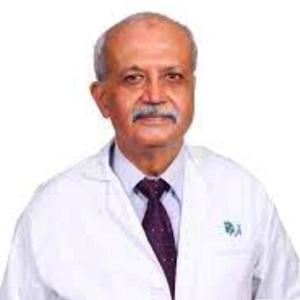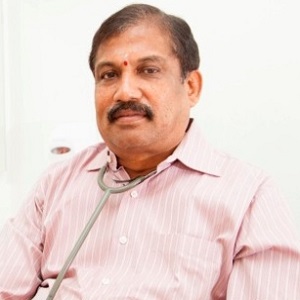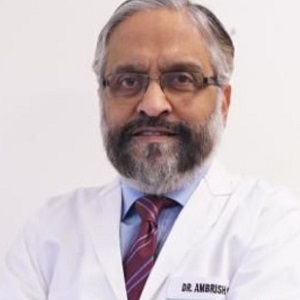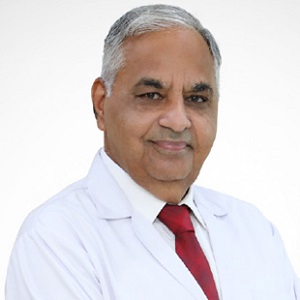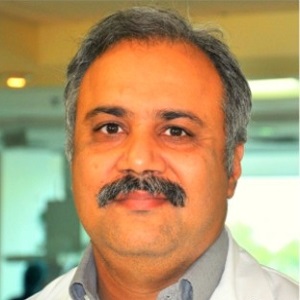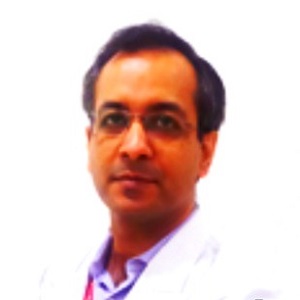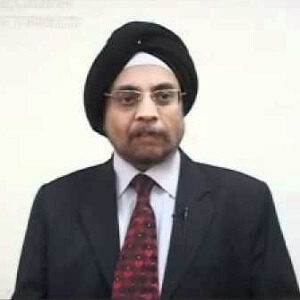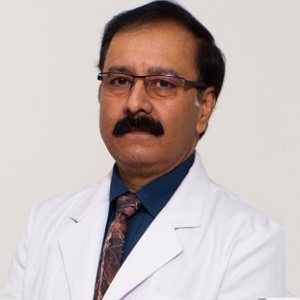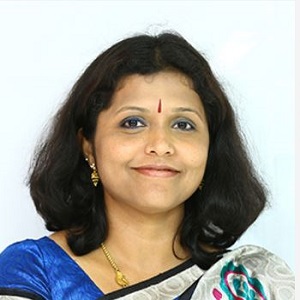Best Doctors in India for Pheochromocytoma Treatment
- Endocrinologist, Diabetologist, New Delhi, India
- Over 26 years’ experience
Profile Highlights:
- Dr. Mohammada Asim Siddiqui is one of the best endocrinologists in India. He has an experience of over 26 years in the field. Dr. Siddiqui is active as a senior consultant – endocrinologist with Apollo Centre for Obesity, Diabetes, & Endocrinology, New Delhi.
- Dr. Siddiqui specializes in Internal Medicine & manages Diabetes, Endocrine and Metabolic Disorders, skin allergies, and Piles Treatment.
- His interest in Diabetes mainly focuses on young and gestational diabetes & Post-transplant & post-metabolic surgery diabetes.
- Dr. Siddiqui is also involved in various clinical research and has penned more than 50 articles in national and international journals.
- Endocrinologist and Diabetologist, New Delhi, India
- Over 40 years’ experience
Profile Highlights:
- Dr. C M Batra is currently associated as a Senior Consultant with the Department of Endocrinology at Indraprastha Apollo Hospitals, New Delhi
- He specializes in Diabetic, Thyroid, Obesity, Reproductive Disorder, Bone and Metabolism
- Dr. Batra is a member of RSSDI, Endocrine Society of India, and the American Endocrine Society
- Endocrinologist & Diabetologist, Chennai, India
- Over 43 years’ experience
Profile Highlights:
- Dr. Rajendiran N holds an experience of more than 4 decades and expertise in diabetic consulting for chronic patients.
- Dr. Rajendiran specializes in Gestational Diabetes, Type 1 Diabetes and Type 2 Diabetes.
- He is the secretary of the Diabetes Association of India (Southern Chapter) and Founder President of Madras Medical College Diabetes Alumni Association.
- Endocrinologist & Diabetologist, New Delhi, India
- Over 38 years’ experience
Profile Highlights:
- Dr. Ambrish Mithal is an endocrinologist, who in 2019, has been nominated to the Governing Council of the National Health Authority, the apex body involved in implementing the ambitious population health coverage plan of the government.
- Dr. Mithal was awarded the Dr. B C Roy Award by the President of India for his contribution to the development of endocrinology in India.
- Endocrinologist & Diabetologist, New Delhi, India
- Over 33 years’ experience
Profile Highlights:
- Dr. Ashok Kumar Jhingan has been treating chronic diabetes patients and has an experience of 33 years in this arena.
- He completed MBBS from Maulana Azad Medical College in 1974, FICA from All India Institute of Medical Sciences, New Delhi in 1975, and MD – General Medicine from All India Institute of Medical Sciences, New Delhi in 1997.
- Dr. Jhingan is known for rendering health education for the prevention and treatment of Diabetes Education
- Endocrinologist, Gurugram, India
- Over 20 years’ experience
Profile Highlights:
- Dr. Dheeraj Kapoor is a well-known Endocrinologist in New Delhi who has expertise in treating diabetes-related complications.
- After completing his MBBS & Masters in Medicine, he did his DM Endocrinology from the Institute of Medical Sciences, Banaras Hindu University, Varanasi
- Dr. Dheeraj Kapoor is an active member of various renowned organizations such as the Association of Physicians of India, the Endocrine Society of India, and Research Society for the Study of Diabetes in India, and the Indian Thyroid Society.
- Endocrinologist & Diabetologist, Gurugram, India
- Over 26 years’ experience
Profile Highlights:
- Dr. Manish Gutch is a well-trained Endocrinologist with specializations in Diabetes & Metabolism, Osteoporosis, Menopause, and Hormonal Disorders.
- He is presently working at Medanta Hospital as the director of the Endocrinology department.
- Dr. Manish Gutch’s high intellectual capacity is reflected through his outstanding achievement of three Gold medals during the successful completion of MBBS, MD, and DM.
- Pediatric Endocrinologist, Diabetologist, New Delhi, India
- Over 36 Years Experience
Profile Highlights:
- Dr. I.P.S. Kochar is one of the best Pediatric Endocrinologists in India, having over 36 years of experience. He is a senior consultant for Pediatric Endocrinology at the Indraprastha Apollo Hospital, New Delhi.
- Dr. Kochar is specialized in the treatment of Growth disorders, metabolic disease, Dyslipidemia, Thyroid Disorders, Osteoporosis, Jaundice, and other Endocrinology problems in children and adolescents. One can also consult Dr. Kochar for weight & height and diabetes management.
- He published numerous writing for many national and international journals.
- Endocrinologist & Diabetologist, Gurugram, India
- Over 35 years’ experience
Profile Highlights:
- Dr. Atul Luthra is a senior consultant in the arena of diabetes and other endocrine disorders.
- He is an excellent teacher and author. He is widely known for delivering guest lectures at various state and national level conferences.
- Dr. Luthra is a prolific speaker and orator, who has a special contribution to diabetes outreach in India.
- Endocrinologist & Diabetologist, Chennai, India
- Over 14 years’ experience
Profile Highlights:
- Dr. Sruti Chandrasekaran is an American board-certified endocrinologist and diabetologist practicing at the Dr. Rela Institute in Chennai as a senior consultant who treats innumerable diabetic patients.
- Ever since she moved back from the University of Maryland she has been heading the endocrine department and managing various endocrine inpatients and outpatients.
Best Hospitals in India for Pheochromocytoma Treatment
Indraprastha Apollo Hospital, New Delhi
- City: New Delhi, India
Hospital Highlights:
- Indraprastha Apollo Hospital is a 700-bedded multispecialty hospital in the heart of the capital of India. It is a part of Apollo Hospital group, one of India’s most reputed healthcare chains. Indraprastha Apollo Hospital has been accredited by Joint Commission International, making it the first internationally accredited hospital in the country in 2005.
- There are 52 specialties in the hospital with one of the best cardiology centers in the country. The hospital is also equipped with State of the art infrastructure facilities with the largest Sleep Lab in Asia and the largest number of ICU bed facilities in India.
- The hospital also has one of the largest dialysis units in India along with a dedicated Bone Marrow Transplant unit.
- The latest and highly advanced technologies that are installed in the hospital include Da Vinci Robotic Surgery System, PET-MR, PET-CT, Cobalt-based HDR Brachytherapy, Brain Lab Navigation System, Tilting MRI, Portable CT scanner, 3 Tesla MRI, 128 Slice CT scanner, DSA Lab, Endosonography, Hyperbaric Chamber and Fibro scan.
Fortis Memorial Research Institute, Gurugram
- City: Gurugram, India
Hospital Highlights:
- Fortis Memorial Research Institute is a multi-super-specialty, quaternary care hospital with 1000 beds. The hospital comprises reputed clinicians, and international faculty and is also equipped with cutting-edge technology. The hospital is a part of Fortis Healthcare Limited, a reputed chain of private hospitals in India.
- It is a NABH-accredited hospital that is spread across 11 acres of land and has a capacity of 1000 beds. The hospital has 55 specialties and is one of the premier health care centers in the Asia Pacific region popularly known as “the Mecca of Healthcare”.
- The hospital has 260 diagnostic centers and is also equipped with the latest and advanced techniques that include 3 Telsa which is the world’s first Digital MRI technology. The hospital also has world-class Radiation Therapy techniques which have been developed by leading technology experts from Elekta and Brain Lab.
Apollo Hospital, Chennai
- City: Chennai, India
Hospital Highlights:
- Apollo Hospitals, Chennai, is one of the best hospitals for heart care in India. Over the years, Apollo has expanded all over India, as a healthcare chain.
- India’s first ‘Only Pancreas’ transplant was performed in Apollo Hospital. The hospital is known for successfully performing Asia’s first en-bloc combined heart and liver transplant, and over the years, it has attained a remarkable achievement in the global healthcare space. Around 3-4 organ transplants are performed in the hospital per day.
- Equipped with over 500 beds, this hospital in Chennai was established in 1983 and since then has been among the most preferred hospital for patients from all over the world.
- The hospital holds accreditation of the NABH and JCI and is the first hospital in India to be ISO 9001 and ISO 14001 certified. It is also the first South Indian Hospital to receive subsequent reaccreditation from the JCI USA 4 times.
Medanta-The Medicity, Gurgaon
- City: Gurugram, India
Hospital Highlights:
- One of India’s best and largest multi-specialty hospitals, Medanta was built with the aim to bring India to the highest standards of medical care. The hospital has been providing the best medical services to its patients, since its inception, with care, commitment, and compassion.
- Equipped with 1250 beds, the hospital was founded by Dr. Naresh Trehan in the year 2009 with an aim to provide the best medical care at affordable costs. The hospital is spread across 43 acres and includes 45 operation theatres and 350 beds dedicated solely to ICU. The hospital includes over 800 doctors, and more than 22 specialty departments and has a dedicated floor for individual specialty in order to offer the best services under one roof.
- The hospital is considered one of the premier institutes in India for Cardiac Care and includes staffs and members of high caliber. The hospital has 6 distinct centers of excellence.
Max Super Specialty Hospital, New Delhi
- City: New Delhi, India
Hospital Highlights:
- One of the well-regarded providers in India committed to the highest standards of clinical excellence and patient care, Max Super Specialty Hospital is a part of Max Healthcare, which is the second-largest healthcare chain in India. Regarded as one of the most well-regarded healthcare providers in the country, Max Super Specialty Hospital is committed to the highest standards of clinical excellence as well as patient care. The hospital is also equipped with the latest technology as well as cutting-edge research. The hospital is known to deliver and ensure the highest level of patient care.
- The hospital has more than 500 beds and offers treatment for over 35 specialties. The hospital also holds the credit of having installed the first Brain Suite in Asia. This is a highly advanced Neurosurgical machine that allows MRI to be taken while surgery is ongoing.
- Other advanced and latest technologies are also installed in the hospital such as the 1.5 Tesla MRI machine, 64 Slice CT Angiography, 4D ECHO, LINAC, and 3.5T MRI machine.
Artemis Hospital, Gurugram
- City: Gurugram, India
Hospital Highlights:
- One of the most well-known hospitals in the Delhi NCR, Artemis Hospital is the first hospital in Gurugram to get accredited by the Joint Commission International.
- With more than 40 specialties, the hospital has been designed to be one of the most technically advanced hospitals in the country, with the best medical and surgical health care. The hospital has eleven special and dedicated centers, for Heart, Cancer, Neurosciences, etc.
- The latest technologies in the hospital include Endovascular Hybrid Operating Suite and Flat panel Cath Labs for the cardiovascular department, 3 Tesla MRI, 16 slice PET CT, 64 Slice Cardiac CT Scan, HDR Brachytherapy, and highly advanced Image Guided Radiation Therapy techniques (LINAC) are installed in the hospital.
- The hospital has won several awards as well, since its inception.
BLK Max Super Specialty Hospital, New Delhi
- City: New Delhi, India
Hospital Highlights:
- Equipped with 650 beds, BLK Superspecialty Hospital is the largest stand-alone private sector hospital in Delhi.
- With over 1500 healthcare providers and 150 globally renowned super specialists, the hospital is one of Asia’s largest Bone Marrow Transplant Centres. The hospital is known for having some of the best cancer doctors in the country.
- The hospital is NABH and NABL accredited and was inaugurated by the first Prime Minister of India. Pt. Jawahar Lal Nehru.
Gleneagles Global Hospitals, Chennai
- City: Chennai, India
Hospital Highlights:
- Established in 1999, Gleneagles Global Hospital, Chennai, is one of the top healthcare facilities in Southern India. It is part of the Gleneagles Hospital Chain, which is the fourth largest healthcare chain in the country. The hospital specializes in multi-organ transplants of kidneys, liver, lungs, heart, etc.
- The hospital has an excellent infrastructure and state-of-the-art lab and equipment set-up. The hospital boasts cutting-edge technologies, a highly skilled team of doctors and surgeons, and trained support staff. Located in Perumbakam, Chennai, it is one of India’s premier health care destinations. The hospital has performed some of the most complex surgical and clinical procedures in India including multi-organ transplantations.
- The hospital’s lung transplantation program is one of the best in the country. The hospital is known for having performed India’s first single lung transplant and first minimal invasive lung transplant. It is also the only Indian hospital to be associated with King’s College Hospital, London, United Kingdom for liver transplantations.
Fortis Hospital, Mulund, Mumbai
- City: Mumbai, India
Hospital Highlights:
- Fortis Hospital in Mulund is a 315-bed multi-speciality tertiary care hospital with five JCI accreditations that offers a wide variety of diagnostic and therapeutic services. The Fortis Hospital in Mulund delivers patient-centred treatment with cutting-edge technology, highly skilled and experienced surgeons, and paramedical staff.
- This institution houses Maharashtra’s largest multi-organ transplant centre. It is also the first heart transplant centre in western India to conduct 100 or more consecutive heart transplants in under four years. It is the only hospital in the city to have multi-organ transplants and has handled the youngest patient for angioplasty. Fortis Hospital Mulund now boasts the first advanced surgical robot in central Mumbai.
- Cardiology and heart surgery, urology, nephrology, neurosciences, orthopaedics, digestive care, emergency and critical care, and maternity care are among the services provided by the hospital.
Kokilaben Dhirubhai Ambani Hospital, Mumbai
- City: Mumbai, India
Hospital Highlights:
- Kokilaben Dhirubhai Ambani Hospital, Named after the wife of Indian industrialist Dhirubhai Ambani, the founder of Reliance Industries, this is one of the top hospitals in Mumbai. This 750-bed multi-specialty hospital became operational in 2009. Known as one of India’s most advanced tertiary care facilities, the hospital is designed to raise India’s global standing as a healthcare hub, with an emphasis on excellence in clinical services.
- Kokilaben Dhirubhai Ambani Hospital uses Protocol and Care Pathway based treatment models to ensure the best outcomes for patients.
- The hospital represents a confluence of top-notch talent, cutting-edge technology, state-of-the-art infrastructure, and, most importantly commitment.
- The hospital also holds the accreditation of the NABH, NABL, CAP, and JCI.
- The hospital has been recognized as the No. 1 Multispecialty Hospital in Mumbai and the West Zone for the fifth year in a row in 2020 by The Week.
Pheochromocytoma
Pheochromocytoma is a rare type of tumor that usually grows in the adrenal glands, above the kidneys. It is also known as an adrenal paraganglioma or a chromaffin cell tumor. It is generally common in adults between the ages of 30 to 50, though people of all ages might have it. Ten percent of all cases are known to occur among children.
Your adrenal glands produce hormones for controlling things like your metabolism and your blood pressure. A pheochromocytoma releases hormones as well, at much higher levels than normal. These extra hormones can lead to high blood pressure, and this might lead to damage to several of your organs, such as your brain, heart, lungs, and kidneys.
Though most pheochromocytoma tumors are benign, around 10 to 15 percent of them are generally cancerous, and they might spread to other parts of the body.
Symptoms
People having these tumors suffer from high blood pressure all the time. For others, it can go up and down.
Most people also have at least one or more of the following symptoms:
- Constipation
- Dizziness while standing
- Pale skin
- Fast or uneven heartbeat
- Severe headache
- Nausea
- Tremors
- Shortness of breath
- Unusual sweating
- Stomach, side, or back pain
- Vomiting
- Weakness
- Anxiety attacks
- Unintended weight loss
These symptoms can occur suddenly, like an attack, multiple times during a day. For some people, they might occur only a few times a month. As the tumor grows, the attacks can get stronger and might occur more often.
In some people, the attacks might be triggered by certain things such as:
- Pressure on the tumor
- Massage
- Certain medications
- Physical activity
- Childbirth
- Surgery
- Too much emotional stress
- Foods containing excessive amino acid tyramine, such as red wine, chocolate, or cheese
Causes & risk factors
Researchers are still unsure of what exactly is the cause of pheochromocytoma. This tumor develops in specialized cells, which are termed chromaffin cells, located in the center of an adrenal gland.
These cells release certain hormones, primarily adrenaline, and noradrenaline that helps to control several body functions, such as heart rate, blood pressure as well as blood sugar.
Adrenaline and noradrenaline trigger your body’s fight-or-flight response when a threat is perceived. The hormones can cause your blood pressure to increase as well as your heart to beat faster. They also prepare other body systems in order to help enable you to react quicker. A pheochromocytoma causes more of these hormones to be released even when you’re not in a threatening situation.
People having certain rare inherited disorders are at an increased risk of pheochromocytoma or paraganglioma. It is also likely that tumors associated with these disorders will be cancerous.
These genetic conditions include the following:
Multiple endocrine neoplasias, type 2 (MEN 2) – This disorder results in tumors in more than a single part of the body’s hormone-producing (endocrine) system. Other tumors which are associated with this condition may appear on the thyroid, tongue, parathyroid, lips, as well as the gastrointestinal tract.
Neurofibromatosis 1 (NF1) – This can result in multiple tumors in the skin, pigmented skin spots as well as tumors of the optic nerve.
Von Hippel-Lindau disease – This disorder can result in tumors at multiple sites, which can include the central nervous system, endocrine system, pancreas as well as kidneys.
Hereditary paraganglioma syndromes – These are inherited disorders which may result in paragangliomas or pheochromocytomas.
Diagnosis
Your doctor might require multiple tests for diagnosing this condition. These can include the following:
- PET imaging
- MRI
- Blood plasma test for catecholamine and metanephrine levels
- Laboratory tests in order to assess the hormone levels
- Urine metanephrines test for catecholamine and metanephrine levels
Treatment
Generally, the primary treatment for pheochromocytoma is surgery for removing the tumor. However, before you go for surgery, your doctor should likely recommend certain blood pressure medications. These are meant to block the actions of the high-adrenaline hormones and to lower the risk of developing extreme high blood pressure.
You will likely receive few drugs which can include alpha-blockers, for improving blood flow and decreasing blood pressure and beta-blockers, to make your heart beat slowly with less force.
It is also likely that your healthcare team will instruct you to consume a high-salt diet. These medications can cause a huge drop in your blood pressure; a high-salt diet will help you draw more fluid inside the blood vessels, and prevent you from having low blood pressure during and after the surgery.
Surgery
During the surgery, in most cases, the surgeon removes the entire adrenal gland with a pheochromocytoma using minimally invasive surgery. For this, your surgeon will need to create a few tiny openings through which he/she will insert wandlike devices equipped with video cameras and small tools.
The remaining healthy adrenal gland is able to carry out the functions normally performed by two. Blood pressure will likely return to normal within a short time.
If the other adrenal gland has been removed, then during the surgery, your doctor will remove only the tumor, and spare some of the healthy tissue.
If a tumor is cancerous, the tumor and other cancerous tissues are going to be removed. However, even if all of the cancerous tissues are not removed, surgery might limit the production of hormones. It also helps in providing some control over the blood pressure.
Cancerous pheochromocytoma treatments
Certains pheochromocytomas are also cancerous. And therefore, other treatments can be required for them, such as:
MIBG
This is a special kind of radiation therapy. It combines MIBG, a compound that attaches to the adrenal tumors, with a type of radioactive iodine. The goal of the treatment is to deliver radiation therapy to a specific site and eliminate the cancerous cells.
Chemotherapy
Chemotherapy involves using powerful drugs for killing fast-growing cancer cells.
Radiation therapy
This treatment might be used for symptomatic treatment of tumors that have spread to other parts of the body and causing pain.
Targeted cancer therapies
Peptide receptor radionuclide therapy (PRRT)
PRRT combines a drug that targets cancer cells with a small amount of a radioactive substance. It allows radiation to be delivered to the cancer cells directly.
People having pheochromocytoma which is not cancerous generally have a 5-year survival rate of 96 percent, while for people with a cancerous tumor, the survival rate is 44 percent.
For ensuring successful treatment, an early diagnosis is not always enough. It is best that you seek out a surgeon who is highly skilled and experienced.
Complications
High blood pressure caused by the tumors can cause damage to various organs, especially tissues of the cardiovascular system, brain, or even the kidneys. Some of the critical conditions include the following:
- Heart disease
- Kidney failure
- Problems with the nerves of the eye
- Stroke


